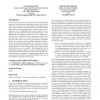Free Online Productivity Tools
i2Speak
i2Symbol
i2OCR
iTex2Img
iWeb2Print
iWeb2Shot
i2Type
iPdf2Split
iPdf2Merge
i2Bopomofo
i2Arabic
i2Style
i2Image
i2PDF
iLatex2Rtf
Sci2ools
ATAL
2010
Springer
2010
Springer
Optimal social laws
Social laws have proved to be a powerful and theoretically elegant framework for coordination in multi-agent systems. Most existing models of social laws assume that a designer is attempting to produce a set of constraints on agent behaviour which will ensure that some single overall desirable objective is achieved. However, this represents a gross simplification of the typical situation, where a designer may have multiple (possibly conflicting) objectives, with different priorities. Moreover, social laws, as well as bringing benefits, also have implementation costs: imposing a social law often cannot be done at zero cost. We present a model of social laws that reflects this reality: it takes into account both the fact that the designer of a social law may have multiple differently valued objectives, and that the implementation of a social law is not costneutral. In this setting, designing a social law becomes an optimisation problem, in which a designer must take into account both th...
Related Content
| Added | 08 Nov 2010 |
| Updated | 08 Nov 2010 |
| Type | Conference |
| Year | 2010 |
| Where | ATAL |
| Authors | Thomas Ågotnes, Michael Wooldridge |
Comments (0)

